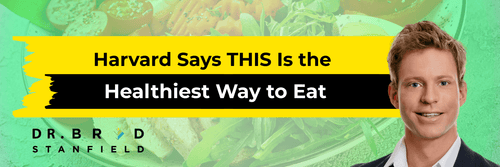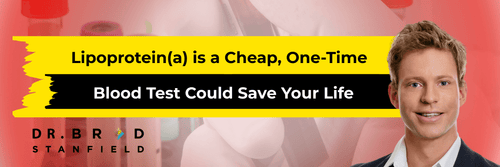One of the leading causes of death around the world today is heart disease caused by plaque building up in our arteries, narrowing and eventually clogging those critical channels that allow our blood to circulate and our body to function.
It's well-known that heart health is heavily affected by the foods we eat. Many foods, including foods high in salt and saturated fats, can cause high cholesterol, high blood pressure, and the build-up of plaque in the arteries, leading eventually to heart attacks, and even death.
Diet plays a critical role in heart health, both in preventing disease and managing existing conditions. But can what we eat actually reverse the damage, such as clogged arteries? The short answer is no—there's no food or supplement to "unclog" arteries. However, a healthy diet, combined with addressing other risk factors, can significantly reduce the progression of plaque build up and, in some cases, lead to a modest reduction.
Table of Contents
The Big Question: Can Diet Unclog Arteries?
First, it's essential to clarify that no single food or supplement will "unclog" arteries. Once plaque has formed, especially in advanced stages, invasive procedures like stents or bypass surgery may be necessary to restore blood flow. However, a heart-healthy diet can slow the progression of atherosclerosis, improve blood vessel function, and, in some cases, lead to a modest reduction in plaque buildup.
A comprehensive approach—focusing on lowering saturated fat, salt, and sugar, while increasing fiber, unsaturated fats, and lean proteins, especially from omega-3-rich sources—has shown benefits in improving cardiovascular risk factors. But it doesn't stop with diet alone.
The good news is, there is evidence that a comprehensive plan can help reverse atherosclerosis. This is, however, not easy. It requires a very aggressive approach to attacking many of the causes of atherosclerosis simultaneously, including smoking, hypertension (high blood pressure), diabetes (uncontrolled blood sugar), and dyslipidemia (high cholesterol).

According to an article published in the American Journal of Medicine,
"Partial reversal of atherosclerosis has been demonstrated unequivocally with the use of intravascular ultrasound. Reversal requires control of all major cardiovascular risk factors. […] Aggressive lowering of low-density lipoprotein (LDL) cholesterol is paramount because the lower the LDL cholesterol, the better the outcome."
What Foods Might Help Unclog Arteries?
Again, it's critical to acknowledge that these foods are not curative. You can't simply eat a clove of garlic every day and solve all of your problems. Addressing atherosclerosis is complex and requires significant change in diet, as well as exercise and other habits such as smoking.

While no foods "unclog" arteries, several dietary components are known to positively affect heart health by lowering cholesterol, reducing blood pressure, and improving blood sugar control—key drivers of atherosclerosis.
Fiber-Rich Foods
Dietary fiber is a critical element of a balanced diet and is essential for regulating appetite, providing food for healthy gut bacteria, regulating blood sugar, and more. Fiber is also known to help lower LDL cholesterol levels.

Fiber-rich foods include:
- Oats and whole grains.
- Legumes like chickpeas, lentils, and beans.
- Fresh fruits.
- Vegetables, especially leafy greens.
- Supplements like psyllium husk.
Psyllium is also one of the supplements I take daily, though of course, just because I take a supplement does not mean you should as well.
Omega-3 Fatty Acids
Omega-3 fatty acids are amino acids commonly found in fatty fish like mackerel, sardines, and salmon, as well as flaxseeds and chia seeds. They can also come from fish oil supplements, though in general, if you can get your nutrients from diet rather than from a supplement, you should.

A large meta-analysis from the American Heart Association found a near-linear decrease in triglyceride and LDL cholesterol as doses of omega-3s increased, suggesting a significant beneficial effect from omega-3s for heart health.
Unsaturated Fats
Decades ago, common wisdom was simply "fat is bad," but the truth is, your body needs a certain amount of dietary fat to function properly. Trans fats and saturated fats are proven to be detrimental, but unsaturated fats are much healthier and help maintain good cholesterol levels.

Replace saturated fats, such as those from red meat and full-fat dairy, with unsaturated fats. Unsaturated fats are commonly found in plant sources like avocados, nuts, and seeds, as well as extra-virgin olive oil.
Plant-Based Proteins
Protein in general will make up a significant portion of a balanced diet. Meat-based protein, however, is frequently found in sources like red meat, high in saturated fats.

Instead, you can get a significant amount of healthy protein from plant-based sources like chickpeas, lentils, and beans. This has the added benefit of providing significant dietary fiber as well.
Phytosterols
Phytosterols are plant-based molecules similar to cholesterol, and which some studies have indicated can help lower cholesterol levels.

Fortunately, they're also easy to find; most fruits and vegetables have some phytosterols in them, and foods such as mango, citrus, cauliflower, nuts, and legumes are all high in phytosterols.
What Ingredients Should You Avoid?
Controlling your diet is important both in terms of what you eat to provide you benefits, and what you don't eat to avoid the detrimental effects. Common wisdom includes ingredients such as excess sodium, saturated and trans fats, and added sugars to the banned list. However, there are also specific foods and ingredients you might consider avoiding.
Saturated and Trans Fats. The distinction between types of dietary fat is critical. Avoiding foods high in saturated fats like red meats and butter, and avoiding foods high in trans fats like processed snack foods, will help reduce your overall cholesterol and plaque built-up.

Red Meats. Similarly, red meats tend to be high in saturated fats, including the fattiest cuts of red meat like hamburgers, pork chops, and roasts. Many dieticians recommend a mediterranean diet as a good place to start on an aggressively heart-healthy diet.
Excess Niacin. Also known as Vitamin B3, niacin is commonly added to fortified foods, especially cereals, and was long thought to help reduce cholesterol. This still may be true at lower levels, but a study from the Cleveland Clinic recently discovered a strong link between the byproducts of niacin breakdown – called 4PY – and heart attacks and other adverse cardiovascular events. Higher levels of niacin, then, are directly damaging. Your body does need some niacin to function properly, but supplementing additional niacin above the recommended daily intake may be inadvisable.
Excess Salt and Sugar. Salt, found both as table salt and as various sodium-based preservatives, is found everywhere in the foods we eat. It's impossible to entirely avoid, but you should try to reduce your sodium intake to reduce the risk of high blood pressure.

Whole, unprocessed foods are best for this. Similarly, while some amount of sugar is both unavoidable and necessary, avoiding overly-sweetened foods and beverages like processed foods is important to avoid the risk of obesity and insulin resistance.
Other Risk Factors: It's Not Just About Diet
It's important to remember that diet is just one part of the equation.

Addressing other risk factors is equally critical to improving heart health.
- Quit smoking. This also includes vaping; increasing evidence suggests that vaping is no less dangerous than smoking, though much more study will need to occur to know exactly how and what is causing which problems.
- Manage your blood pressure. High blood pressure damages arteries over time. Regular exercise, dietary adjustment, and medications can all help keep it in a healthy range.
- Get more exercise. A sedentary lifestyle is a significant determining factor of heart disease, but even something as simple as walking can get you started on a path to physical activity. Losing weight as a secondary benefit is also a tangible source of impact, with a reduction of 3-5% of body weight in obese individuals helping to lower cholesterol and heart disease risk.
- Explore medications. If your doctor recommends it, is to take a medication to help. Statins are the go-to medications, and are a common prescription for individuals at risk of developing stroke or coronary artery disease. I personally take a low dose of rosuvastatin, which I discuss in greater detail here.
At the end of the day, no single food, ingredient, or supplement is going to solve all of your problems.
Final Thoughts
There's no magic bullet for heart disease, but a comprehensive approach to lowering saturated fat, increasing fiber, and managing other risk factors can go a long way in protecting your heart. It's important to talk with your doctor about lifestyle changes, diet, and medications that suit your individual needs.

As always, I'll continue to monitor the latest scientific evidence to bring you the most up-to-date advice on heart health. Stay tuned to my blog and YouTube channel for more insights.
Sources:
- ConsumerLab – Which supplements or foods can help lower cholesterol and keep my heart healthy? Are there any to avoid?: https://www.consumerlab.com/answers/which-supplements-can-help-keep-my-heart-healthy/supplements-for-heart-health/?search=arteries
- The American Journal of Medicine: Stop Stenting; Start Reversing Atherosclerosis: https://www.amjmed.com/article/S0002-9343(20)30945-1/fulltext
- Nature – Intake of food rich in saturated fat in relation to subclinical atherosclerosis and potential modulating effects from single genetic variants: https://www.nature.com/articles/s41598-021-86324-w
- Dietary Fats and Cardiovascular Disease: A Presidential Advisory from the American Heart Association: https://www.ahajournals.org/doi/10.1161/CIR.0000000000000510
- Cleveland Clinic – Phytosterols: https://my.clevelandclinic.org/health/drugs/17368-phytosterols-sterols--stanols
- Effect of garlic on cardiovascular disorders: a review: https://www.ncbi.nlm.nih.gov/pmc/articles/PMC139960/
- Effectiveness of red yeast rice on carotid atherosclerosis: A systematic review and meta-analysis: https://www.ncbi.nlm.nih.gov/pmc/articles/PMC9478999/
- Supplementation with psyllium seed husk reduces myocardial damage in a rat model of ischemia/reperfusion: https://www.ncbi.nlm.nih.gov/pmc/articles/PMC6548711/
- Cleveland Clinic-Led Study Discovers Link between High Levels of Niacin – a Common B Vitamin – and Heart Disease: https://newsroom.clevelandclinic.org/2024/02/19/cleveland-clinic-led-study-discovers-link-between-high-levels-of-niacin-a-common-b-vitamin-and-heart-disease
- Heart-healthy lifestyle changes from the National Heart, Lung, and Blood Institute: https://www.nhlbi.nih.gov/health/atherosclerosis/treatment
- Atherosclerosis and Coenzyme Q10: https://www.ncbi.nlm.nih.gov/pmc/articles/PMC6834161/







































